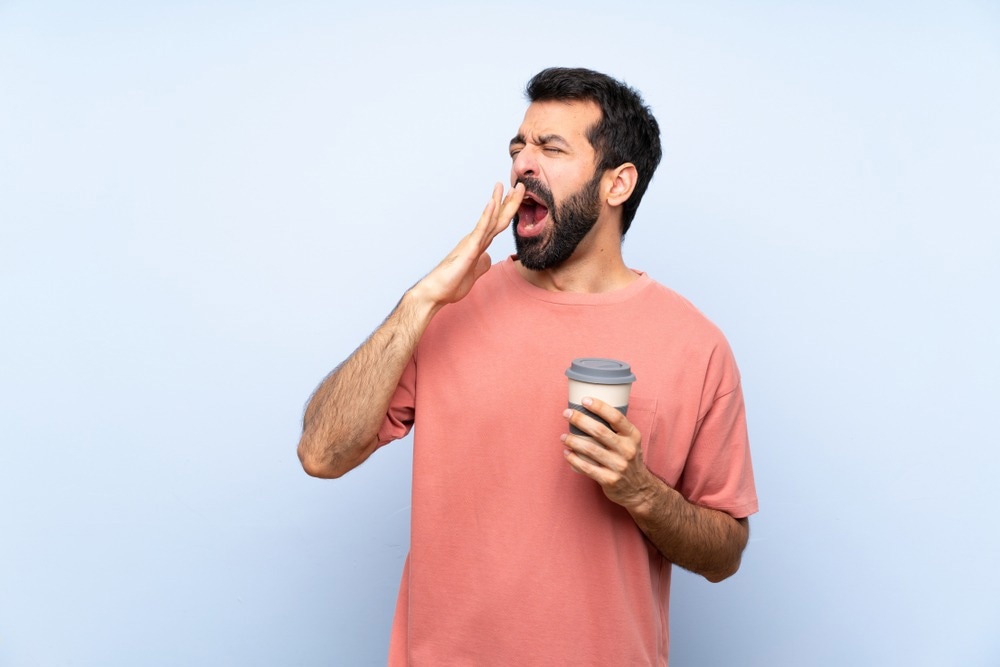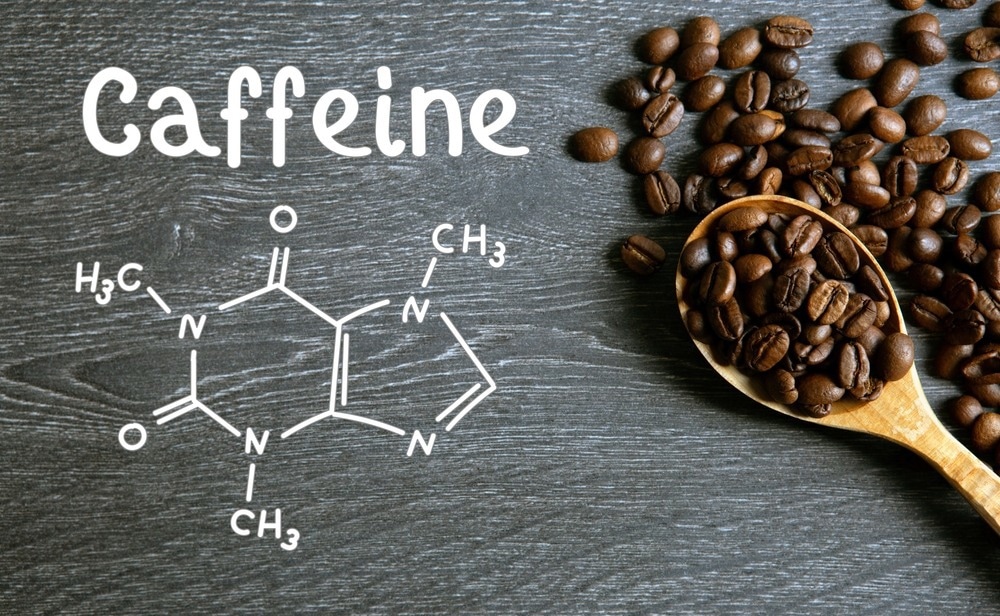The science of caffeine: How it usually works
Why some people feel sleepy after drinking coffee
Caffeine metabolism and individual differences
Other factors that contribute to feeling sleepy after coffee
What to do if coffee makes you sleepy
References
Further reading
Coffee is widely known for its stimulating effects, primarily due to its caffeine content. However, under certain conditions, coffee can paradoxically lead to feelings of sleepiness rather than alertness caused by the development of a tolerance phenomenon.

Image Credit: Luis Molinero/Shutterstock.com
The science of caffeine: How it usually works
Caffeine is a stimulating compound with direct effects on the central nervous system (CNS).1 It primarily works as an adenosine antagonist by blocking adenosine receptors, which promote sleep and relaxation by slowing down neural activity.1
When caffeine binds to adenosine receptors, it promotes the release of excitatory neurotransmitters, such as norepinephrine and dopamine, while also inhibiting the secretion of inhibitory neurotransmitters like gamma-aminobutyric acid (GABA).1
Its blocking effect on adenosine receptors is due to its structural similarities to adenosine.2 Instead of slowing down nerve cell activity, it prevents the activation of these receptors, thereby avoiding the signals that cause drowsiness and leading to increased alertness and wakefulness.1,2
In addition to blocking adenosine, caffeine also influences skeletal muscle and adipose tissues by inhibiting phosphodiesterase enzymes.2 This inhibition promotes lipolysis by activating hormone-sensitive lipases, leading to the release of free fatty acids and glycerol.l2 These substances act as fuels in skeletal muscle, sparing the use of muscle glycogen (glucose storage in the liver).2
The physiological effect of caffeine consumption is a state of alertness that helps the consumer stay awake during times of tiredness. This can promote a cycle in which more caffeine is needed to maintain wakefulness, and abstaining from caffeine can lead to severe fatigue.

Image Credit: mizar_21984/Shutterstock.com
Why some people feel sleepy after drinking coffee
Regular caffeine consumption can lead to tolerance, reducing its effects on alertness and wakefulness. Two primary mechanisms may contribute to this tolerance: increased expression of adenosine receptors and elevated adenosine levels in the brain.3
Some studies have shown that the brain responds to chronic caffeine intake by increasing the number of adenosine receptors.3 This allows more adenosine to bind, counteracting caffeine's blocking effect and reducing its stimulant impact.3
Additionally, regular caffeine consumption may lead to a build-up of adenosine in the brain.3 This increased adenosine concentration can affect caffeine's ability to block all the receptors, diminishing its effects.3
Caffeine's effect on GABAergic systems might also play a role in tolerance development.4 Some studies suggest that caffeine can suppress GABAergic signaling, potentially increasing dopamine activity.4 Conversely, other studies indicate that caffeine can promote GABA release, potentially having the opposite effect.4
Interestingly, studies have shown that the reduction in GABAergic activity is normalized under conditions of caffeine tolerance.4 This suggests that caffeine doses and the duration of treatment play a role in modulating GABAergic signaling, and optimizing these factors could potentially modulate the activity of the GABAergic system.4
It is important to note that research on this topic is inconclusive, especially in humans, with some studies showing clear tolerance effects than others.3,4 This could be due to individual differences in inherent tolerance, making it difficult to study acquired caffeine tolerance.3
Caffeine metabolism and individual differences
Once ingested, caffeine is rapidly absorbed, with 99% uptake within the first 45 minutes post-ingestion.2 It binds to plasma proteins and distributes them throughout the body, even crossing the blood-brain barrier.2 It is metabolized in the liver by cytochrome P4501A2, and it is converted to paraxanthine, the principal metabolite involved in caffeine's pharmacological effects.2
Particularly, caffeine metabolism can be affected by consumers' behavior (e.g., smoking and oral contraceptive use) and genetic factors, causing differences between individuals, with some experiencing drowsiness despite its stimulant properties.2
Genetic variations significantly influence how caffeine affects individuals. Variants near the ABCG2, AHR, POR, and CYP1A2 genes impact how the body metabolizes caffeine, affecting its clearance and overall response.5
Polymorphisms in genes like PER3 and COMT have been linked to individual differences in caffeine's effects during sleep deprivation.6 Variations in adenosine receptor genes, such as the A2A receptor, also play a role in mediating caffeine's arousal effects, suggesting that these genetic differences can affect how caffeine influences alertness and sleepiness.7
Regular caffeine consumption can lead to tolerance, reducing its stimulant effects.3 This occurs as the body increases the number of adenosine receptors to counteract caffeine's blocking effect, diminishing its impact on alertness and wakefulness.3
Tolerance can develop quickly, affecting mental alertness and performance, and may require increased caffeine intake to achieve the same effects.3 However, reducing caffeine intake can help overcome tolerance.8
Other factors that contribute to feeling sleepy after coffee
Caffeine is a natural diuretic that enhances urine production and potentially leads to dehydration if consumed in excess without adequate water intake.9 This dehydration may result in symptoms like fatigue and dizziness. However, since coffee is more than 95% water, its diuretic effects are usually insufficient to cause dehydration unless consumed in large amounts.9
Coffee can also impact blood sugar levels, particularly when consumed with added sugars, leading to sugar crashes characterized by an initial spike followed by a rapid drop in blood sugar, causing fatigue and lethargy.
A 2019 systematic review of caffeine's effects on glucose metabolism revealed discrepancies between short-term and long-term effects.10 Acute consumption increased the area under the curve (AUC) of glucose, while long-term use decreased glucose AUC and increased insulin AUC, suggesting improved glucose metabolism.10
Why Do You Feel Sleepy After Drinking Coffee? The Surprising Science Behind It | Dr. Brett Berner
Nonetheless, research also indicates increased insulin resistance in type 2 diabetes patients, contributing to blood sugar fluctuations and fatigue.11
The timing of coffee consumption also matters; drinking it near bedtime can disrupt sleep patterns, leading to next-day tiredness.12 Caffeine blocks adenosine receptors, preventing sleepiness initially, but may cause a rebound effect of drowsiness once it wears off.12
What to do if coffee makes you sleepy
Effective caffeine management involves understanding personal consumption habits and the body's response.13 Regular caffeine intake can lead to tolerance.13 To counteract this, individuals can gradually reduce consumption or consume it less frequently.13
It's important to consider individual tolerance and potential health implications when adjusting intake.13 Gradual reduction helps avoid withdrawal symptoms. Smaller, more frequent doses consumed earlier in the day can optimize benefits.13
People should explore alternative energy sources like herbal teas, nutrient-rich foods, and drinks. If caffeine's effectiveness decreases, it is due to increased tolerance.13 It is important to note that prioritizing sleep, exercise, and stress management will always be the best way to boost energy naturally.13
References
- Papadelis, C. et al. (2003)Effects of mental workload and caffeine on catecholamines and blood pressure compared to performance variations. Brain Cogn 51, 143-154. https://doi.org/10.1016/s0278-2626(02)00530-4
- Research., I. o. M. U. C. o. M. N. in Caffeine for the Sustainment of Mental Task (2001)Performance: Formulations for Military Operations. Vol. 2 (National Academies Press (US), Washington (DC),).
- Reichert, C. F., Deboer, T. & Landolt, H. P. (2022)Adenosine, caffeine, and sleep-wake regulation: state of the science and perspectives. J Sleep Res 31, e13597. https://doi.org/10.1111/jsr.13597
- Alasmari, F. (2020)Caffeine induces neurobehavioral effects through modulating neurotransmitters. Saudi Pharm J 28, 445-451. https://doi.org/10.1016/j.jsps.2020.02.005
- Consortium., C. a. C. G. et al. (2015)Genome-wide meta-analysis identifies six novel loci associated with habitual coffee consumption. Mol Psychiatry 20, 647-656. https://doi.org/10.1038/mp.2014.107
- Erblang, M. et al. (2021)Genetic Determinants of Neurobehavioral Responses to Caffeine Administration during Sleep Deprivation: A Randomized, Cross Over Study (NCT03859882). Genes (Basel) 12. https://doi.org/10.3390/genes12040555
- Retey, J. V. et al. (2007) A genetic variation in the adenosine A2A receptor gene (ADORA2A) contributes to individual sensitivity to caffeine effects on sleep. Clin Pharmacol Ther 81, 692-698. https://doi.org/10.1038/sj.clpt.6100102
- Morales, A. P, et al. (2020) Caffeine Supplementation for 4 Days Does Not Induce Tolerance to the Ergogenic Effects Promoted by Acute Intake on Physiological, Metabolic, and Performance Parameters of Cyclists: A Randomized, Double-Blind, Crossover, Placebo-Controlled Study. Nutrients 12. https://doi.org/10.3390/nu12072101
- Clinic, C. (2024)Grounded in Reality: Does Coffee Dehydrate You?, [Online] https://health.clevelandclinic.org/coffee-dehydration.
- Reis, C. E. G., Dorea, J. G. & da Costa, T. H. M. Effects of coffee consumption on glucose metabolism: A systematic review of clinical trials. J Tradit Complement Med 9, 184-191 (2019). https://doi.org/10.1016/j.jtcme.2018.01.001
- Liao, S. Diabetes and Caffeine, (2023), [Online] https://www.webmd.com/diabetes/diabetes-and-caffeine.
- NIH. & Health., N. i. (2020) Tired or Wired? Caffeine and Your Brain, [Online] https://newsinhealth.nih.gov/2020/10/tired-or-wired.
- Fielding, S. (2021) 3 reasons you may not feel the full effects of caffeine and alternatives ways to boost your energy [Online] https://www.businessinsider.com/guides/health/diet-nutrition/why-doesnt-caffeine-affect-me.
Further Reading
Last Updated: Oct 25, 2024